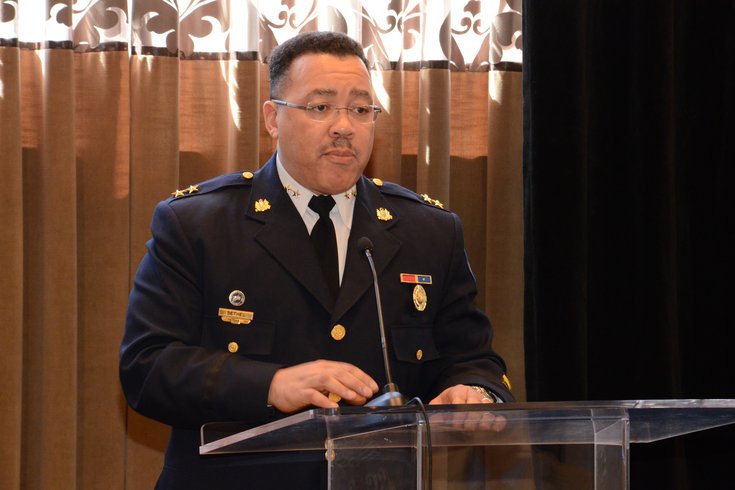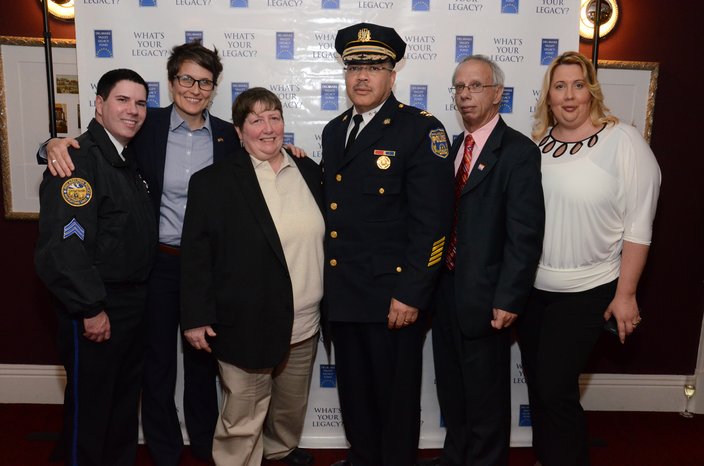
April 24, 2015
 Freedom G Photography/for PhillyVoice
Freedom G Photography/for PhillyVoice
Deputy Commissioner Kevin Bethel at the Delaware Valley Legacy Fund's awards brunch on Sunday, April 12.
Philadelphia Police Department Deputy Commissioner Kevin Bethel isn't the guy who actively seeks out awards; in truth, he just wants to do the right thing.
How did the trans directive come about?
I joined [the Philly LGBT Police Liaison Committee] and took over that charge a few years ago. Part of the conversation in those committee meetings was a rising response to the LGBT community and how we as a police department were all treating the trans community, and one of the things I realized we didn’t have was a policy. I looked around the country and saw that LAPD and San Francisco and other departments were more progressive in bringing together a policy that helps trans men and women and at the same time holds us accountable. We talked about what we would do, and I said, ‘Maybe let’s work on directives.’ And so what we decided to do was form a group ... and work together and develop a policy. And as a result of that conversation, and commitment from some [outside] people, the policy was put into place.
Has there been any pushback within the department?
No pushback. When you’re talking about the department and being progressive when going into a policy, I think the men and women in the department really didn’t have pushback because a lot of us lack knowledge of the community, so a good part of the directives is -- you know, the first three pages are definitions. We had to define the transgender community and what those terms are, things like that. To be honest with you, it was an education for me. Understanding different terminologies and things of that nature. So in the department, we wanted everyone to know exactly what was expected of him or her when they were dealing with the transgender community. And I think there were questions about pronoun usage when in contact with a person, and even when we have these public interviews. … I think it’s been positively received. I haven’t heard anyone say, ‘Why would you do that?’ If anything, this is something that should have happened a long time ago.
How is implementation going? Do officers know the directive exists?
The easy part is to put the policy in play; it takes work to get it on paper. But the other challenge is, like anything else, change doesn’t happen overnight. We still have a lot of work to do with our officers [men and women], informing them (about) policy and their responsibility that relates not just to the transgender community but people in general. The policy is to treat everyone with respect no matter who you encounter. But just because we put a policy in place doesn’t mean we won’t encounter -- there will be people who stand up to the policy and go against the policy, but the policy is something trained in our academy now. Prior to 2013, the LGBT Police Liaison Committee comes up to the academy and did a training session with every [class] that’s graduated in the last five years -- maybe more. So now a part of that training is this policy as well. ... I hesitate to say that just because we [have the policy] we’ll immediately have full compliance. It will take some time to educate people.
Why do you think it's important that this policy is in place?
I think that, first and foremost, when you put something in policy it goes beyond you. It becomes organizational, it’s not just about one individual -- it’s about the organization and the commitment the org has made to do the right things. So, it’s existence is important in that we had 151 directives before that, but these directives -- this directive --won’t go away. You can’t come in one day and arbitrarily say, ‘We’re no longer going to have Directive 152,’ without getting [an official challenge], but more importantly, for the community it can say, ‘Wait a minute, we had a directive that ensured the officers were acting a certain way with the transgender community,’ and I think the good part about putting it in directive form is it means it will live beyond me and you -- it will be updated and changed and may be challenged, but it won’t go away. I think people, that’s why people are so appreciative of it because they realize moving policy into an org of this size, to decide it was an important enough issue to become a directive, is significant.

Were you surprised to get an award?
I’m not the guy who likes to get awards, and I wasn’t aware of the nomination at the time so I feel blessed to be in a position to be able to make policy. So if my reward comes from just doing the right thing, then it’s clearly an honor to receive the award. ... I enjoy doing things for the right reasons and making an impact beyond yourself. I’m not a person who looks for awards, but I’ll tell you it’s also an honor. Particularly, the LGBT community being so appreciative of what you’re doing – the number of people who shook my hand at the awards ceremony, me and my wife talked about it on the way home and we felt rewarded. It may be a minor step to implement a policy, but when you look at people who have been discriminated against in different states and forms, writing a policy that has an impact on that is rewarding in itself.
What's the greatest lesson you’ve learned at the department?
There have been so many lessons that I can’t say that one was the greatest, but just the strength of people. That there’s good in everyone, and that you have to have empathy in this job, if you want to do it effectively. Because we’re often called to places where people are having the most difficult time of their lives, and having that empathy, you can put yourself in their place no matter how difficult it may be for you to do that sometimes, so you can have a better understanding of how to serve them.
What does being a fearless leader mean to you?
To me, it means it’s all about public opinion, negative voices, biases both explicit and implicit, [not being] a part of your decision process. Do things for the right reasons, and if you do that you won’t worry about whether you’re liked tomorrow and whether your decisions go against the Old Boys Network or some organization. You’re doing it for the right reasons and doing it as someone who’s purpose-driven. You know why you’re doing it and you know it’s the right thing to do, and you’re not doing it because of all these other entities that try to sway you to do things for negative reasons or whatever it may be. If you do that, it’s fearless because you’re not worrying about ramifications. You can get up every day and know you did the right thing.